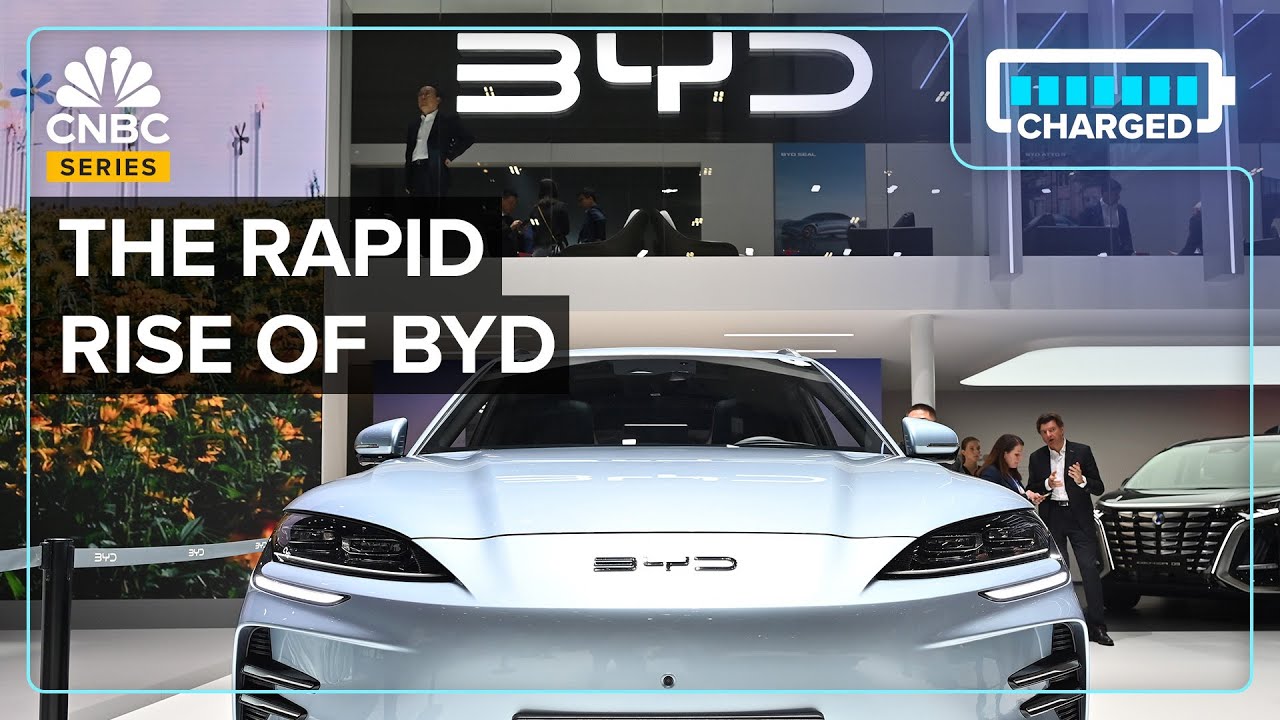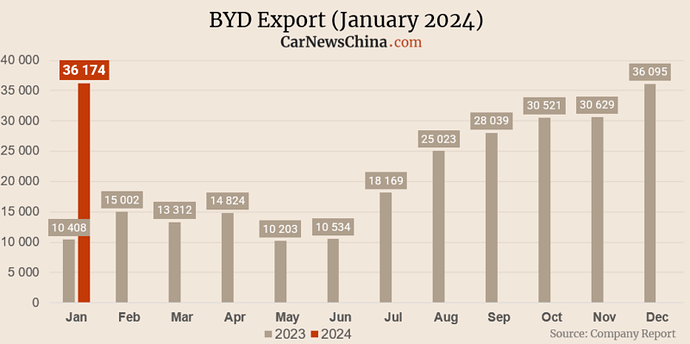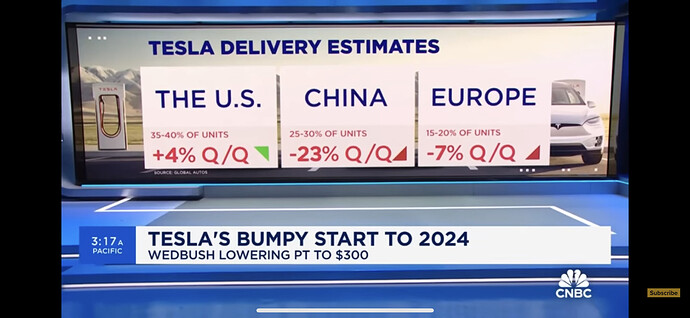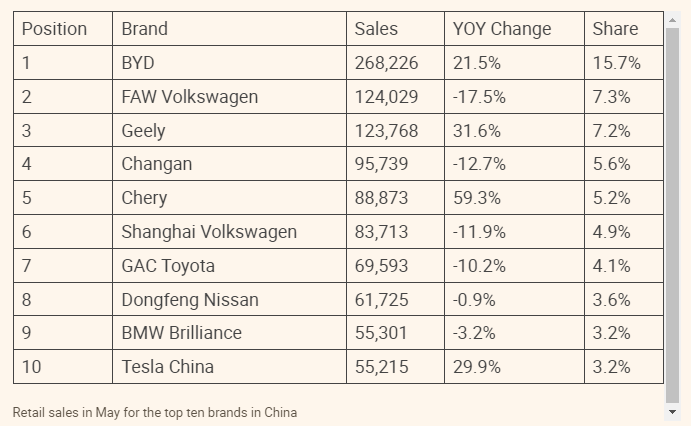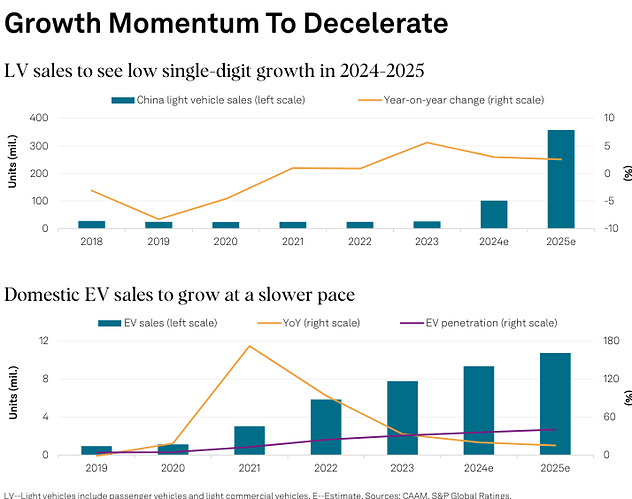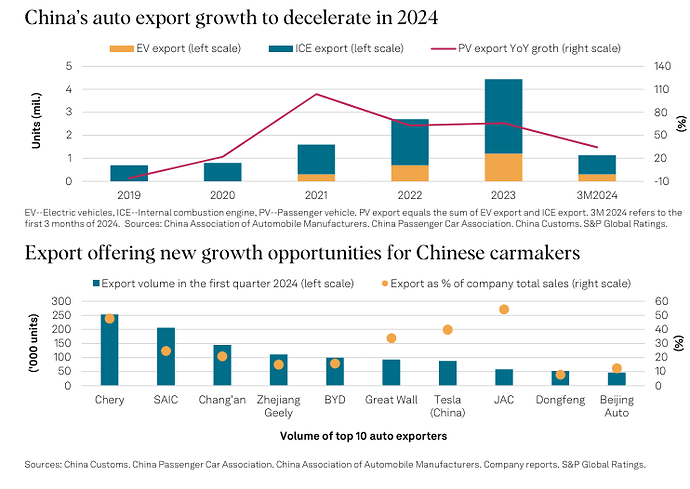This topic will cover developmentts in the Chinese automotive industry. You can find a wiki article on the same here:
- China Passenger Car Association(PCA) expects deliveries to end customers to have fallen by 1.3% year-over-year to 1.85 million vehicles in August.
- For 2023, deliveries is expected to grow 5% year-over-year.
- The reason for the decline in deliveries in August and the prior two months is the end of incentives provided by the People’s Republic.
- Car sales in China rose 2% year-over-year in August to 1.9 million vehicles, that’s according to China Passenger Car Association(CPCA).
- CPCA had forecasted that sales will decline 1.3% y/y to 1.85 million vehicles in August.
Passenger car sales to end customers in China rose 6% year-over-year to 2.03 million in September, according to China Passenger Car Association(PCA).
- China Passenger Car Association (PCA) said car sales in China should increase by 2.3% year-over-year in November, above the one fifth growth forecasted at the beginning of this month.
- November of last year was weak due to lockdowns associated with Corona pandemic.
- According to preliminary calculations by China Passenger Car Association (PCA), car sales grew by 25% y/y to 2.06 million in Novemeber, beating their recent forecast for a growth of 2.3% y/y.
- Month-over-month, car sales grew by 1%.
- A year ago, vehicle sales were dampened by Covid lockdowns.
China Passenger Car Association (PCA) projects that passenger car deliveries to Chinese customers will decline by 15.7% y/y to 1.15 million units in February due to the New Year celebrations.
Deliveries to Chinese customers fell by 21% y/y to 1.09 million units in February, that’s according to
China Passenger Car Association (PCA) which had projected a decline of 15.7%.
December 12, 2023
Passenger vehicle sales in China is projected to grow by 3.1% in 2024 to 26.8 million units, down from 10.3% increase in 2023, that’s according to the China Association of Auto Manufacturers (CAAM).
China car sales expected to rise 3% in 2024: industry association.
I liked these BYD overviews:
- BYD exports grew 334% in 2023.
- They owned about 40% of the EV market on China
- BYD is now the largest manufacturer of EVs. Surpassing Tesla production.
- Most of their winning strategy: price. Their battery manufacturing capacities help with this. Their vertical integration strategy seems to hugely help them with costs and supply chain management and flexibility.
- Europe market is a number 1 priority for them. Due to the legislation and incentives to go electric. They are looking to build a factory in Hungary, which could eliminate tariffs.
- They are also planning manufacturing plant in Mexico. Factories in Mexico could eliminate trade barriers for US due to NAFTA.
- If German brands want to compete with BYD and Tesla the key factors are innovation and price. If they are not more innovative than them, they can’t be more expensive either.
Elon Musk: if they are not trade barriers established, China car companies will pretty much demolish most other car companies in the world. They are extremely good.
I think it is interesting as well. I would actually be interested at one point in analyzing BYD as a potential investment target.
If you say exports grew by 334% and they own 40% of Chinas EV market what are the absolute numbers behind that?
That helps me to compare numbers with Volkswagen, know how large the EV market is in China etc.
China’s BYD Co, the world’s biggest seller of battery electric vehicles (BEVs) and plug-in hybrids, sold about 3.02 million vehicles in 2023, an increase of 61.9%.
In 2023, BYD exported a total of 242,765 vehicles. That would mean ~2.7M sales in China in 2023.
BYD sold 201,493 vehicles in January, 40% down, export at an all-time high.
BYD Concludes 2023 with Record 3 Million Annual Sales, Leading Global NEV Market.
- Car deliveries in China rose by 7% y/y to 1.7 million units in March, exceeding expectations for a 4% y/y increase.
- The better-than expected sales was attributed to a 28% y/y increase in electric vehicle deliveries, which benefited from high price discounts.
It’s interesting that this comes while Tesla saw a Q1 2024 8.5% y/y decline to 386,810 cars way below analyst estimates and problems in China.
It points to the competitiveness of Chinese EV manufacturers.
It seems like that. Very different story for BYD.
- In the first quarter, BYD sold 626,263 new-energy vehicles, which includes EVs and plug-ins, up 13% from a year earlier. The company said Monday that March sales surged 46% after slipping in the first two months of the year.
- For Q1 2024, BYD sold roughly 300,114 pure EVs globally, up 13% over the prior-year period. Sales of plug-in hybrids, which made up 52% of the company’s total first-quarter sales, rose 14% to about 324,000 vehicles.
In May , retail sales of passenger cars in the country reached 1.7 million units, down 1.9 percent year on year but was 11.4 percent higher than the previous month.
In addition, China’s retail sales of new energy vehicles (NEVs) soared by 38.5 percent year on year to 804,000 units in May, while NEV exports decreased by 4 percent compared with a year earlier to 94,000 units.
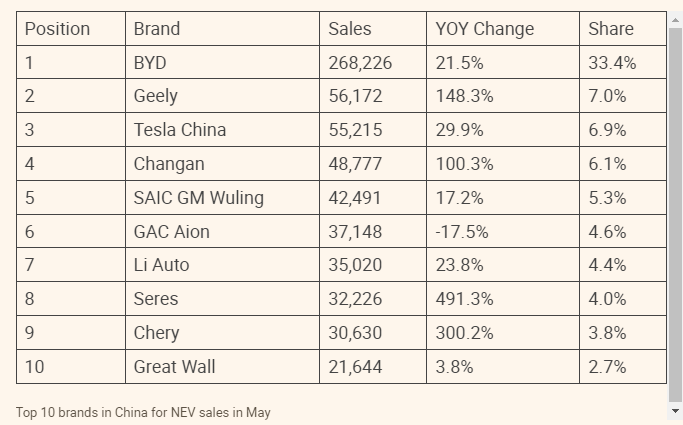
A total of 8.07 million passenger cars were sold via retail channels in China during the January-May period, an increase of 5.7 percent year on year, according to the China Passenger Car Association.
The association attributed the solid performance of the auto market in the first five months to a number of factors, including the implementation of a trade-in policy, the Beijing auto show and various supportive policies introduced at local levels, among others.
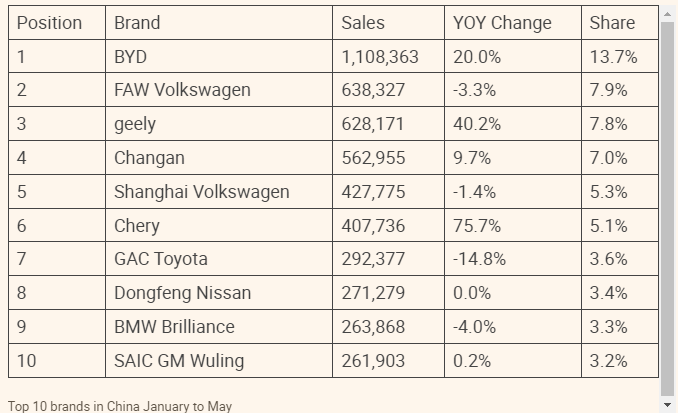
According to S&P Global:
- China’s domestic light vehicle sales to increase by 2%-3% annually in 2024-2025, from 5.6% in 2023.
- Domestic electric vehicle sales to grow 15%-20% per annum over the period, from over 30% last year.
Growth will likely come off in the following quarters as base effect diminishes.
Upside may emerge if the government’s support on auto trade-in and carmakers’ promotions induce higher-than expected purchases.
Competition
- Competitive edge in EV will support Chinese brands to further gain market share over the next 12 months.
• Foreign brands’ collaboration with Chinese EV makers will take time to yield results .
• Price war will continue with auto OEMs racing for share amid increasing supply.
• Carmakers with scale advantage and vertical integration will fare the pricing impact better than peers.
• Auto suppliers with low bargaining-power will see greater margin pressure, as OEMs seek greater cost reductions this year
Export Growth
Nevertheless, export growth is set to soften in 2024, given a high base and rising trade hurdles. Passenger vehicle export grew by 34% in the first quarter, compared with 66% in 2023.
Longer term, more sustainable growth overseas for Chinese auto makers will come from their localized operations in markets including Southeast Asia, Europe and Latin America.
https://www.spglobal.com/_assets/documents/ratings/research/101596837.pdf
I=6
The China Passenger Car Association (CPCA) projects that retail car sales will grow by only 2% in 2025 to 23.4 million units, compared to growth of 5.5% to 22.894 million vehicles in 2024.
EV exports from China is expected to stagnate in 2025
- The China Passenger Car Association (CPCA) does not expect exports of EVs from China to grow further this year mainly due to the EU tariffs and demand problem.
- CPCA projects that overall car exports from China will grow by 10% this year.
